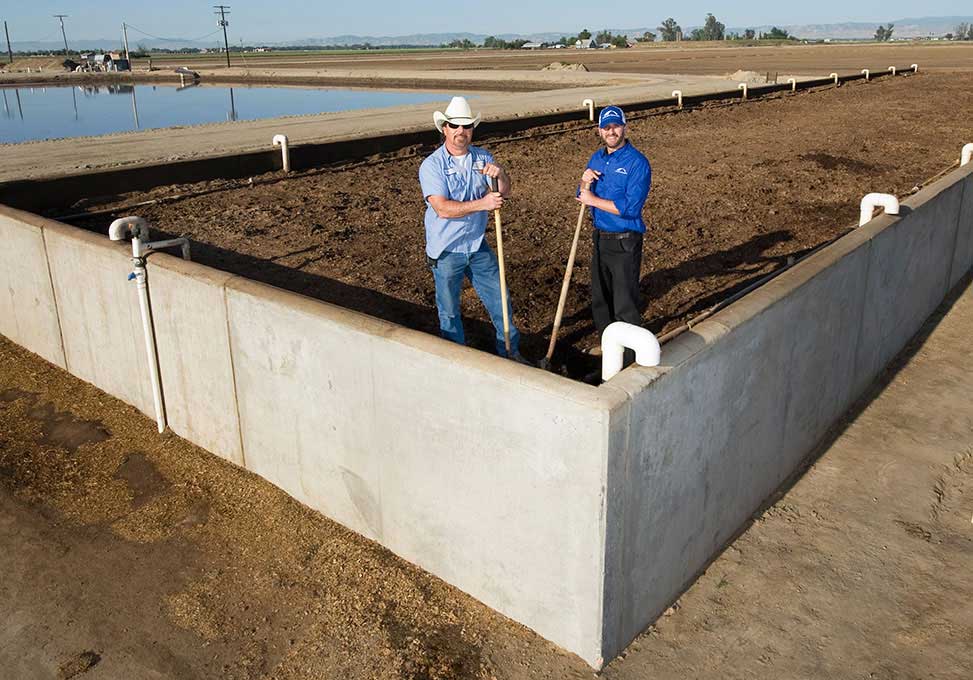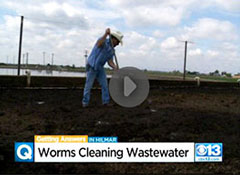Pioneering Project Helps Dairy Industry Promote Clean Water

At Fanelli Dairy in Hilmar, CA, owner Vic Fanelli and Sustainable Conservation Senior Project Manager Joe Choperena dig for worms – the invertebrate stars of a dynamic system that treats dairy wastewater and holds great potential for improving water quality on farms and in local communities.
Second-generation dairyman Vic Fanelli knows a thing or two about innovation. “He just had the eye,” Vic says of his father’s visionary, cross-country scouting missions for premium bovine lineage to improve local herds. “He’d drive all over New England, visiting big farms and little shacks. He’d talk to anyone and didn’t judge places by appearance – so he always found the best heifers to bring back to California.”
Like his dad before him, Vic is always on the lookout for ways in which to improve his operation and craft an enduring legacy for his kids, his grandkids – and his community. Vic’s penchant for trying new things elevated him as the perfect partner for Sustainable Conservation in testing a biological wastewater treatment system that employs millions of surprising – and surprisingly tiny – nitrogen gobblers: worms.
Vic, his brother Robert, and their families run Fanelli Dairy in the San Joaquin Valley – by far the biggest milk-producing region of the Golden State, which provides 20% of the country’s supply. Milk production comes with its fair share of challenges, including a continuous stream of cow manure that can compromise local groundwater and drinking water if not managed properly.
To help address this issue, Fanelli Dairy’s wastewater is pumped through a series of filters to remove sand and other solids before being sprayed via sprinklers into the so-called worm box – a concrete container housing the worms and their microbial buddies, as well as layers of wood shavings and rocks. The worms consume organic matter in the wastewater as it percolates through the layers – removing approximately 90% of total nitrogen from the liquid in the four hours it takes to exit the tank.
Treated wastewater moves on to irrigate the crops that feed Vic’s cows, and the worms leave behind their own nutrient-rich co-product, known as castings, that can be sold as a high-value soil amendment to operations like nurseries and vineyards.
Managed by Sustainable Conservation, the Fanelli Dairy demonstration project showcases the unique system’s promise to promote clean water, thriving farms, and healthy communities. “They have it a lot easier than I did!” Vic jokes of his sons, who will inherit their father’s – and grandfather’s – innovations. A dedicated family man and neighbor, Vic wouldn’t want it any other way.
Learn More
Media Coverage
Sustainable Conservation is partnering with BioFiltro, an international company with a subsidiary in Fresno, CA, to demonstrate their worm-based wastewater treatment technology on a dairy. At Fanelli Dairy – the first commercial-scale host site in the U.S. – we’re testing how the system could help safeguard local groundwater and drinking water from nitrogen pollution from cow manure. The USDA Natural Resources Conservation Service provided a $483,950 grant for the project, which includes scientific evaluation of water, air, and soil quality benefits by researchers at University of California, Davis and Denele Analytical, Inc., as well as an economic analysis of the sale of worm castings by California Polytechnic State University, San Luis Obispo.

Joe Choperena
Senior Project Manager
A native son of the San Joaquin Valley, Joe grew up on a walnut orchard in Madera. His parents emigrated from the Basque Country in Northern Spain to raise Joe and his two older sisters in California’s agricultural cradle. Joe is deeply committed to making a difference in the Valley communities he knows so well, and focuses on forging partnerships with farmers like Vic Fanelli, scientists, and technology vendors to address critical water quality and supply issues.


